外研版(2019)必修第一册Unit 1 A new start Listening and Speaking 课件(共14张PPT,内镶嵌音频)
文档属性
| 名称 | 外研版(2019)必修第一册Unit 1 A new start Listening and Speaking 课件(共14张PPT,内镶嵌音频) | 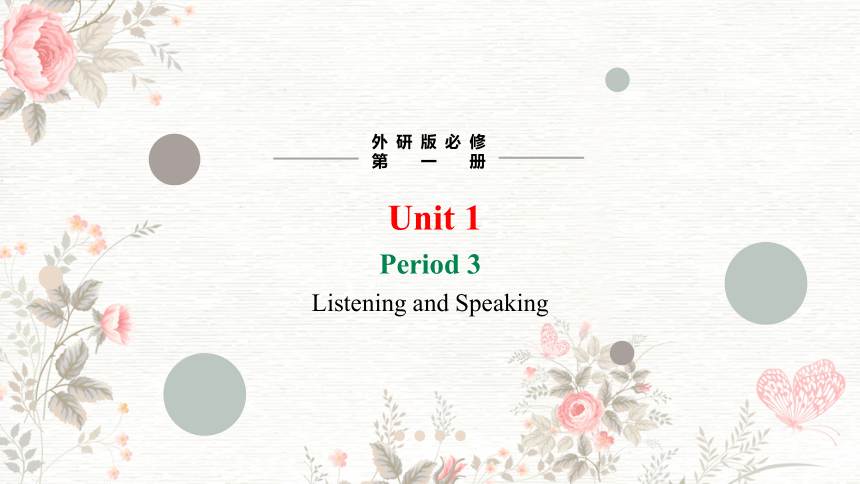 | |
| 格式 | pptx | ||
| 文件大小 | 9.1MB | ||
| 资源类型 | 教案 | ||
| 版本资源 | 外研版(2019) | ||
| 科目 | 英语 | ||
| 更新时间 | 2023-12-10 21:07:19 | ||
图片预览

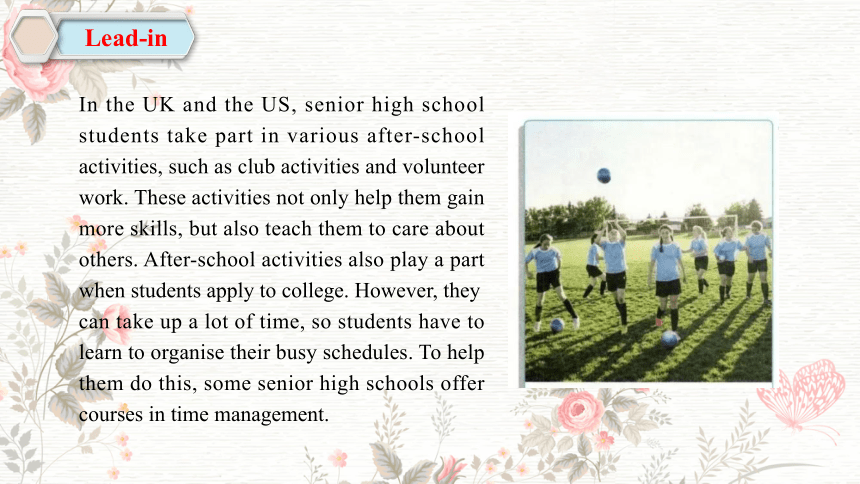
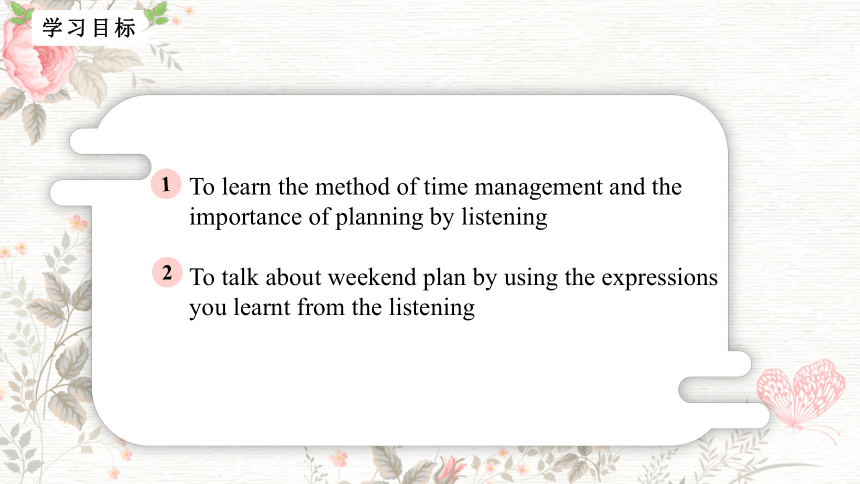
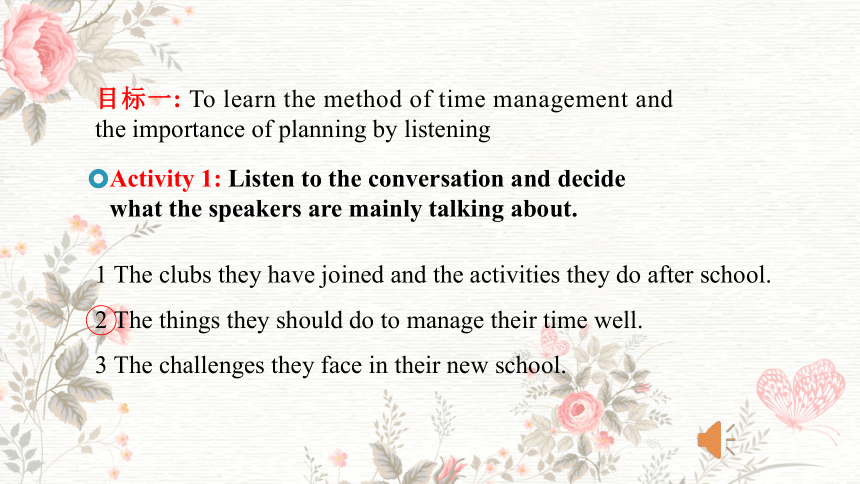
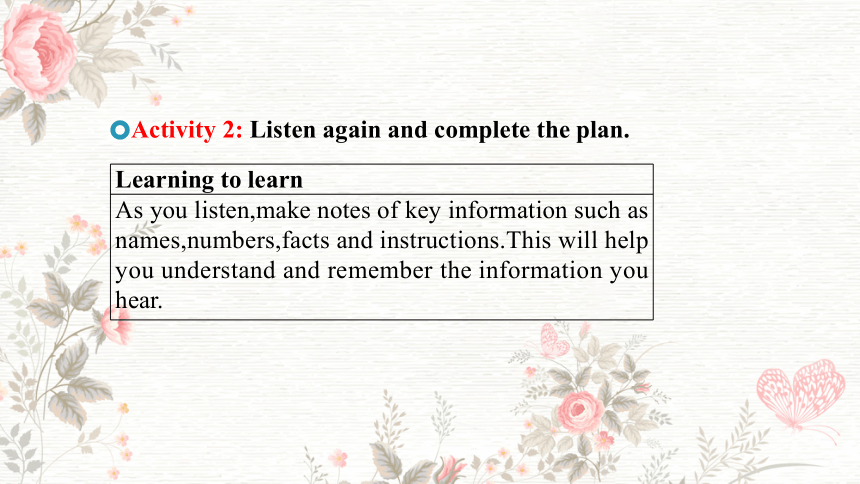
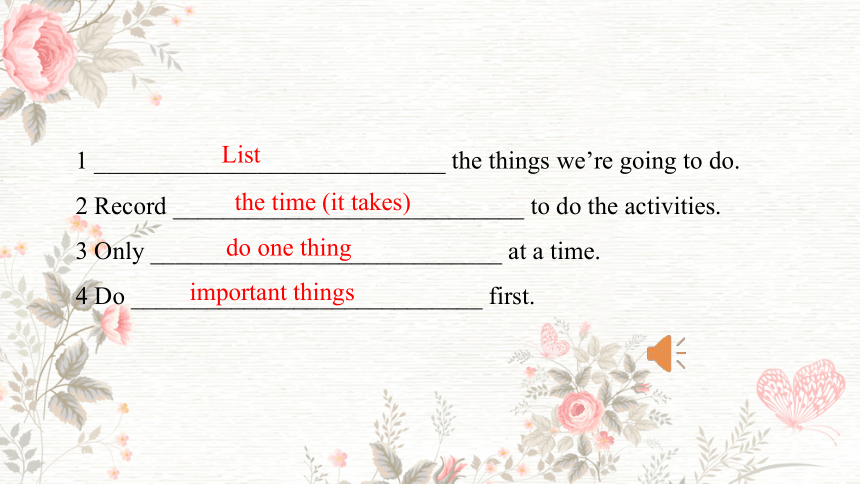
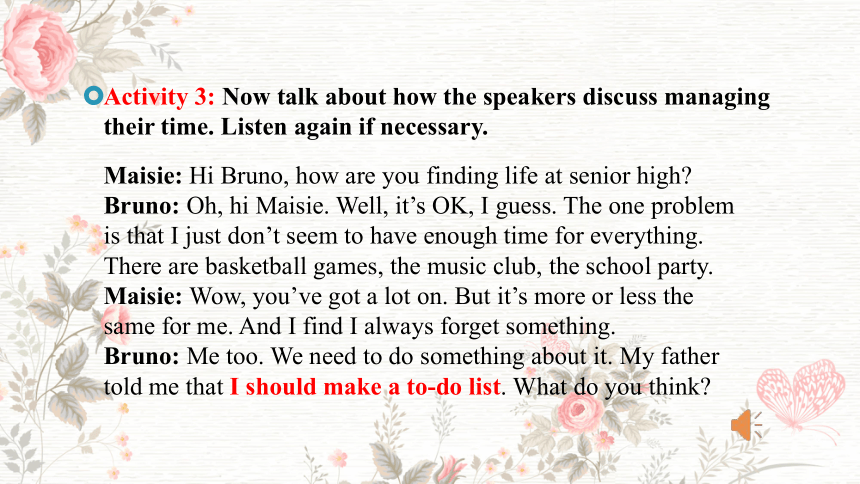
文档简介
(共14张PPT)
外研版必修
第一册
Unit 1
Period 3
Listening and Speaking
教学目
Lead-in
In the UK and the US, senior high school students take part in various after-school activities, such as club activities and volunteer work. These activities not only help them gain more skills, but also teach them to care about others. After-school activities also play a part when students apply to college. However, they can take up a lot of time, so students have to learn to organise their busy schedules. To help them do this, some senior high schools offer courses in time management.
1
2
To learn the method of time management and the importance of planning by listening
To talk about weekend plan by using the expressions you learnt from the listening
目标一: To learn the method of time management and the importance of planning by listening
Activity 1: Listen to the conversation and decide what the speakers are mainly talking about.
1 The clubs they have joined and the activities they do after school.
2 The things they should do to manage their time well.
3 The challenges they face in their new school.
Activity 2: Listen again and complete the plan.
Learning to learn
As you listen,make notes of key information such as names,numbers,facts and instructions.This will help you understand and remember the information you hear.
1 ____________________________ the things we’re going to do.
2 Record ____________________________ to do the activities.
3 Only ____________________________ at a time.
4 Do ____________________________ first.
List
the time (it takes)
do one thing
important things
Activity 3: Now talk about how the speakers discuss managing their time. Listen again if necessary.
Maisie: Hi Bruno, how are you finding life at senior high
Bruno: Oh, hi Maisie. Well, it’s OK, I guess. The one problem is that I just don’t seem to have enough time for everything. There are basketball games, the music club, the school party.
Maisie: Wow, you’ve got a lot on. But it’s more or less the same for me. And I find I always forget something.
Bruno: Me too. We need to do something about it. My father told me that I should make a to-do list. What do you think
Maisie: It’s a good idea to list the things we’re going to do.
Bruno: And how about recording the time it takes to do the activities We can then see what takes up most of our time and make better plans. What’s your opinion
Maisie: Great idea. And I’ve got two more ideas. Number one, only do one thing at a time. That way, you’ll get things done more quickly. For example, if you do your homework while watching TV, it will just take longer to finish your homework. Number two, do important things first.
Bruno: Nice ideas!
Maisie: How about we try all of them for a week and see if things get better
Activity 1: Work in pairs. Act out the conversation to discuss ideas for a weekend study plan for English.
目标二: To talk about weekend plan by using the expressions you learnt from the listening
Student A:
You and Student B want to improve your English and are making a weekend study plan. Decide on the time and place for each study activity. You have the following ideas:
1. Go to the bookshop to buy a new dictionary.(It’s open from 9 am to 6 pm.)
2. Take part in the English Club Drama Day.(It’s on Saturday from 6 pm to 8 pm.)
Useful expressions
What do you think
How about…
What’s your opinion
It would be a good idea to…
I’ve got an idea.
Useful expressions
What do you think
How about…
What’s your opinion
It would be a good idea to…
I’ve got an idea.
Student B
You and Student A want to improve your English and are making a weekend study plan. Decide on the time and place for each study activity. You have the following ideas:
1. Review this week’s English lessons together at your or Student A’s home.
2. Watch a new English-language film at the cinema.
(There’s one that starts at 12:30 pm, 3:30 pm, and 7:30 pm, lasting one and a half hours)
Example:
A: Hi, Amy. As to our weekend plan, what’s your opinion
B: Let’s do the important things first. How about reviewing this week’s English lessons together
A: We can make it at my home on Saturday afternoon. Then we could possibly take part in the English Club Drama Day from 6 to 8 pm at our school close to my home. What do you think
B: No problem! It would be a good idea to watch a new English-language film at the cinema at 12:30 pm on Sunday.
A: OK. But before that, how about going to the bookshop to buy a new dictionary first at 9 am on Sunday
B: That’s a good idea. A dictionary is a necessary tool for us to learn words.
A: Yes. If we have any problems, we can turn to it for help.
B: Let’s record the things we’re going to do and the time they take.
A: Cool. On Saturday afternoon, we’ll review this week’s English lessons together at my home from 2:00 to 4:00 pm. After that, we take part in the English Club Drama Day from 6 to 8 pm at our school.
B: On Sunday, we’re going to the bookshop to buy a new dictionary first at 9 am and watch a new English-language film at the cinema at 12:30 pm next to our school.
A: Sounds great! See you then!
B: See you!
Activity 2: Work in pairs. Make another weekend plan and have a similar conversation.
1 Can you list the ways of time management mentioned in the listening
2 Can you share your weekend plan with your classmates
外研版必修
第一册
Unit 1
Period 3
Listening and Speaking
教学目
Lead-in
In the UK and the US, senior high school students take part in various after-school activities, such as club activities and volunteer work. These activities not only help them gain more skills, but also teach them to care about others. After-school activities also play a part when students apply to college. However, they can take up a lot of time, so students have to learn to organise their busy schedules. To help them do this, some senior high schools offer courses in time management.
1
2
To learn the method of time management and the importance of planning by listening
To talk about weekend plan by using the expressions you learnt from the listening
目标一: To learn the method of time management and the importance of planning by listening
Activity 1: Listen to the conversation and decide what the speakers are mainly talking about.
1 The clubs they have joined and the activities they do after school.
2 The things they should do to manage their time well.
3 The challenges they face in their new school.
Activity 2: Listen again and complete the plan.
Learning to learn
As you listen,make notes of key information such as names,numbers,facts and instructions.This will help you understand and remember the information you hear.
1 ____________________________ the things we’re going to do.
2 Record ____________________________ to do the activities.
3 Only ____________________________ at a time.
4 Do ____________________________ first.
List
the time (it takes)
do one thing
important things
Activity 3: Now talk about how the speakers discuss managing their time. Listen again if necessary.
Maisie: Hi Bruno, how are you finding life at senior high
Bruno: Oh, hi Maisie. Well, it’s OK, I guess. The one problem is that I just don’t seem to have enough time for everything. There are basketball games, the music club, the school party.
Maisie: Wow, you’ve got a lot on. But it’s more or less the same for me. And I find I always forget something.
Bruno: Me too. We need to do something about it. My father told me that I should make a to-do list. What do you think
Maisie: It’s a good idea to list the things we’re going to do.
Bruno: And how about recording the time it takes to do the activities We can then see what takes up most of our time and make better plans. What’s your opinion
Maisie: Great idea. And I’ve got two more ideas. Number one, only do one thing at a time. That way, you’ll get things done more quickly. For example, if you do your homework while watching TV, it will just take longer to finish your homework. Number two, do important things first.
Bruno: Nice ideas!
Maisie: How about we try all of them for a week and see if things get better
Activity 1: Work in pairs. Act out the conversation to discuss ideas for a weekend study plan for English.
目标二: To talk about weekend plan by using the expressions you learnt from the listening
Student A:
You and Student B want to improve your English and are making a weekend study plan. Decide on the time and place for each study activity. You have the following ideas:
1. Go to the bookshop to buy a new dictionary.(It’s open from 9 am to 6 pm.)
2. Take part in the English Club Drama Day.(It’s on Saturday from 6 pm to 8 pm.)
Useful expressions
What do you think
How about…
What’s your opinion
It would be a good idea to…
I’ve got an idea.
Useful expressions
What do you think
How about…
What’s your opinion
It would be a good idea to…
I’ve got an idea.
Student B
You and Student A want to improve your English and are making a weekend study plan. Decide on the time and place for each study activity. You have the following ideas:
1. Review this week’s English lessons together at your or Student A’s home.
2. Watch a new English-language film at the cinema.
(There’s one that starts at 12:30 pm, 3:30 pm, and 7:30 pm, lasting one and a half hours)
Example:
A: Hi, Amy. As to our weekend plan, what’s your opinion
B: Let’s do the important things first. How about reviewing this week’s English lessons together
A: We can make it at my home on Saturday afternoon. Then we could possibly take part in the English Club Drama Day from 6 to 8 pm at our school close to my home. What do you think
B: No problem! It would be a good idea to watch a new English-language film at the cinema at 12:30 pm on Sunday.
A: OK. But before that, how about going to the bookshop to buy a new dictionary first at 9 am on Sunday
B: That’s a good idea. A dictionary is a necessary tool for us to learn words.
A: Yes. If we have any problems, we can turn to it for help.
B: Let’s record the things we’re going to do and the time they take.
A: Cool. On Saturday afternoon, we’ll review this week’s English lessons together at my home from 2:00 to 4:00 pm. After that, we take part in the English Club Drama Day from 6 to 8 pm at our school.
B: On Sunday, we’re going to the bookshop to buy a new dictionary first at 9 am and watch a new English-language film at the cinema at 12:30 pm next to our school.
A: Sounds great! See you then!
B: See you!
Activity 2: Work in pairs. Make another weekend plan and have a similar conversation.
1 Can you list the ways of time management mentioned in the listening
2 Can you share your weekend plan with your classmates
